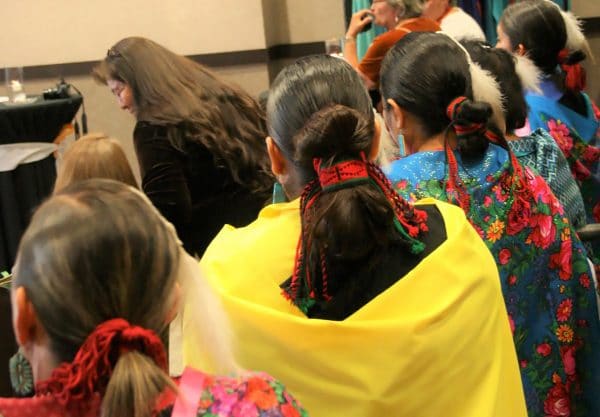 According to Samantha Sabo, Community Health Representatives (CHRs), tribal-based community health workers, are unique and valued members of the healthcare system serving American Indian communities.
According to Samantha Sabo, Community Health Representatives (CHRs), tribal-based community health workers, are unique and valued members of the healthcare system serving American Indian communities.
Sabo, an associate professor for Northern Arizona University’s Center for Health Equity Research and for the Department of Health Sciences, said CHRs play a critical role in care coordination and case management for their clients — work that is even more valuable during the COVID-19 pandemic.
Sabo, along with Louisa O’Meara and Alisa Neel, both research assistants at CHER, recently completed the second phase of a two-phase published report — Community Health Representative Workforce Assessment 2020 and 2019 for the Arizona Advisory Council on Indian Health Care (AACIHC) in collaboration with the Arizona Community Health Representative Coalition.
“Community Health Representatives are considered by many to be the backbone of health care delivery in Native American communities,” Sabo said. “Their work is invaluable, which we are seeing highlighted now more than ever as they provide essential support for public health efforts to combat the COVID-19 pandemic.”
In both phases of the CHR Workforce Assessment, CHER researchers collaborated with the AACIHC to develop and conduct interviews with CHR managers in Arizona focusing on CHR program organization, structure, financing, health system integration, and evaluation.
The Community Health Representative (CHR) workforce has been in existence for 52 years and serves as the oldest and only federally funded community health worker (CHW) workforce in the United States.
The CHER researchers found that nationally, the CHR workforce consists of approximately 1,700 CHRs representing 264 Tribes. Of the 22 Tribes in Arizona, 19 Tribes operate a CHR Program and employ approximately 246 CHRs – which is equivalent to 30 percent of the total community health worker (CHW) workforce in Arizona.
Work of CHRs includes providing:
- Home visits
- Patient monitoring and screening, including blood pressure, blood sugar
- Case management and care coordination
- Patient advocacy
- Referrals to service providers
- Health education, including chronic disease prevention
- Non-emergency transportation services
- Medical interpretation and translation
- Benefits of CHRs
CHR programs are all tribally directed, which allows each program to tailor its efforts to the specific needs of its community. CHER researchers found that CHRs are highly focused on improving a number of critical Social Determinants of Health for their clients, including increasing their clients’ access to health care through screenings, transportation and care coordination, and direct health care services.
Because CHRs are from the communities they serve, they play a unique and essential role as cultural and linguistic bridges between their patients and the medical establishment. Additionally, CHRs serve as advocates for their clients and their communities, maintaining close working relationships with other Tribal programs, health care providers, state entities, and the Indian Health Service (IHS) system.
“We know the CHR workforce is critical to the health and wellbeing of Tribal community members throughout the US, especially now, during the COVID-19 pandemic, where Tribal communities have been disproportionately affected with COVID-19 related hospitalization rates six to eight times higher compare to white community members,” said Kim Russell, executive director of the AACIHC.
“Every day, we hear of new ways CHRs serve as the vital link between community and health systems –– in care coordination, contact tracing and surveillance and in ensuring community members are able to prevent COVID-19 by addressing the social determinants of COVID-19, including access to water, food, and medicines,” she said.
Barriers for CHR Programs
Despite being an integral part of health care delivery in their communities, CHRs were found to face a number of barriers to full integration into the greater health system. These included gaps in communication and information sharing practices, as well as a lack of understanding of the CHR workforce among health system staff, including healthcare providers.
Another challenge for CHR Programs is that they are unable to accurately evaluate the impact of their activities, as they lack access to effective data management systems that would enable them to track both process and outcomes measurements.
“There is significant anecdotal evidence for the effectiveness of CHR work on improving health outcomes among their clients,” said O’Meara, “However, CHR Programs need access to data tracking tools to prove their value and impact on the communities they serve in order to ensure continued federal funding.”
The CHER researchers also found that CHR programs participating in their assessment had to employ a variety of financing strategies to sustain their programs, supplementing IHS funding with limited Medicaid reimbursement, Tribal General Funds, and grants.
Finally, this workforce assessment provides several policy recommendations, focusing on improving health system integration, program evaluation, and financing, which aim to support the future sustainability and growth of the CHR program.
“The three strategies CHR Tribal Programs in Arizona have been focusing on to sustain the workforce are providing reimbursement for the services they provide, whether through Medicaid or other third party insurers, attaining CHW certification, which documents a standard of skills and competencies they possess, and further integrating CHRs into primary medical teams,” Russell said.
For more information on the phase I and II reports, visit the CHER Community Health Workers page.